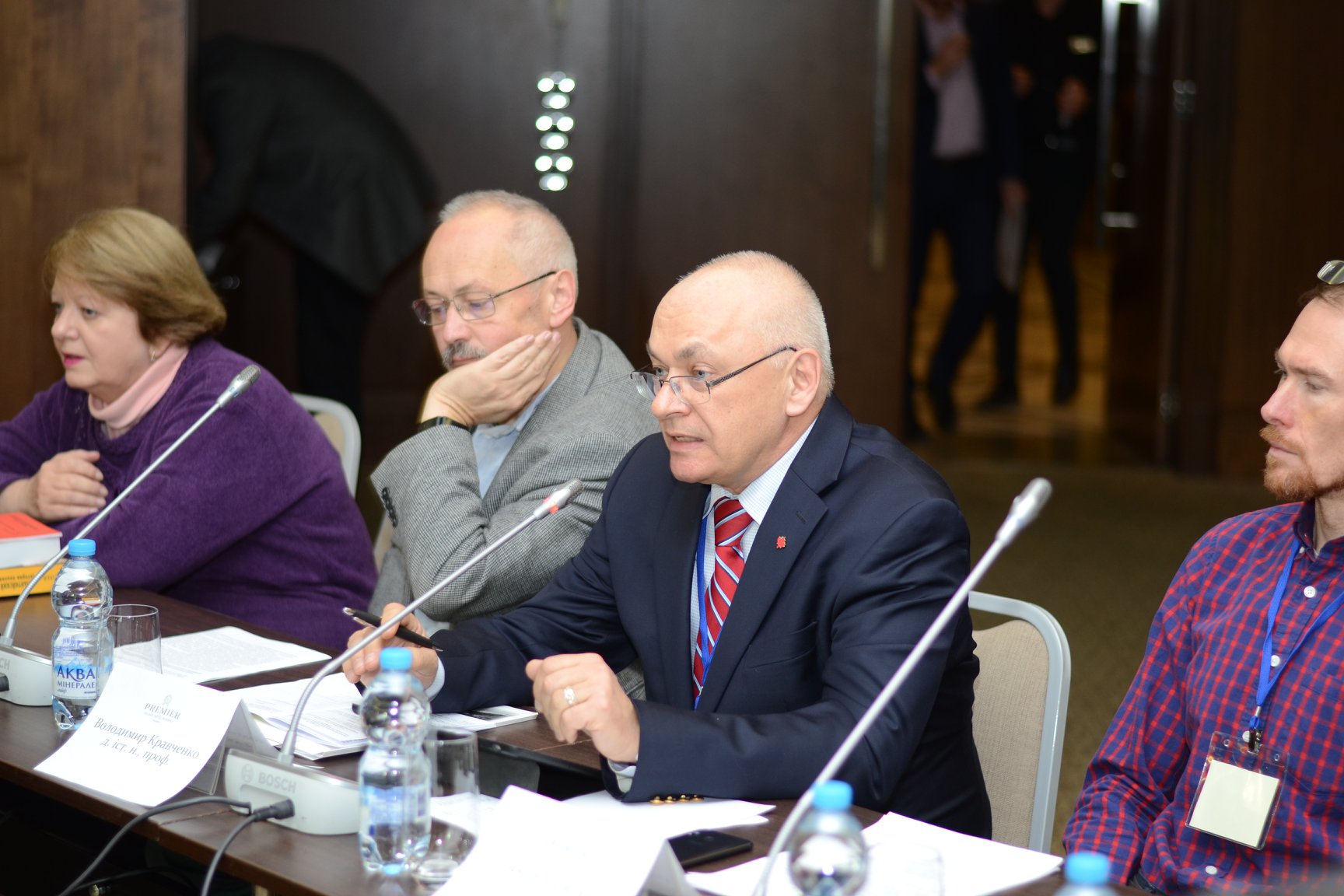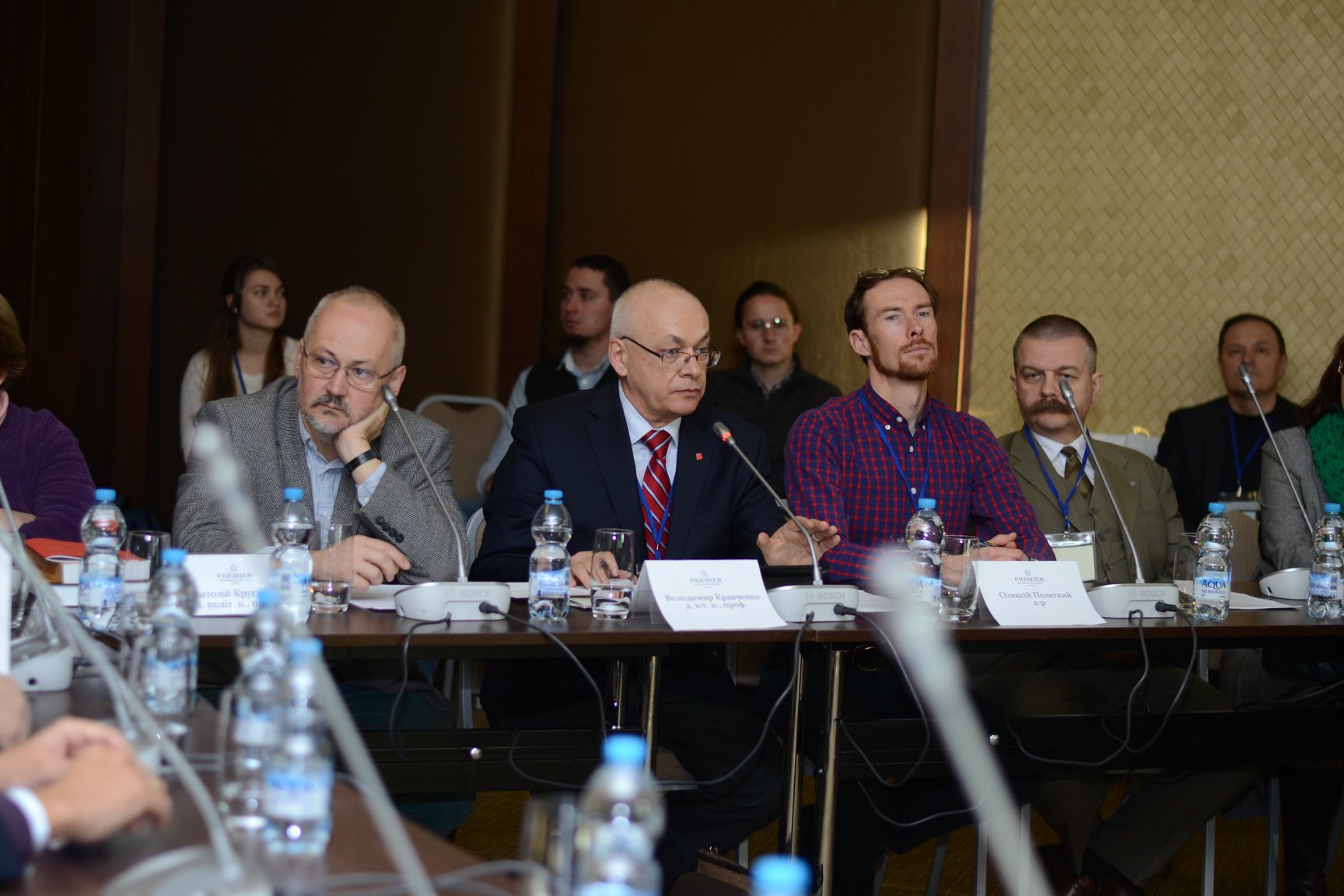
A round table supported and organized in part by the Contemporary Ukraine Studies Program (CUSP) at the Canadian Institute of Ukrainian Studies, University of Alberta (CIUS), took place on November 23, 2018, at the Premier Palace Hotel in Kharkiv. Entitled "Problems of Regional Security and Integration in the Context of Globalization: From the 20th-century Intermarium Concept to the 21st-century Three Seas Initiative," the round table served as a discussion platform for an international academic conference just held at the Karazin National University of Kharkiv, itself titled"The Black Sea and Region as a Contact Zone of Civilizations and Cultures."The round table was attended by over seventy area specialists from nine countries, and was also streamed online via Facebook.
Prof. Volodymyr Kravchenko, CUSP Director at CIUS, and Prof. Anatoli Kruhlashov, Director of the European Integration and Regional Research Studies Center at the Fedkovych National University of Chernivtsi (Ukraine), served as moderators of the round table. The gathering was opened with greetings brought by Mr. Janusz Jablonski, Consul General of Poland in Kharkiv, representing the state which first proposed the idea of the Intermarium after WWII, and subsequently revived it in the format of the Baltic, Adriatic, Black Sea (BABS) Initiative within the EU.
Presentations were given on the following topics:
Prof. Volodymyr Kravchenko, CUSP Director at CIUS, and Prof. Anatoli Kruhlashov, Director of the European Integration and Regional Research Studies Center at the Fedkovych National University of Chernivtsi (Ukraine), served as moderators of the round table. The gathering was opened with greetings brought by Mr. Janusz Jablonski, Consul General of Poland in Kharkiv, representing the state which first proposed the idea of the Intermarium after WWII, and subsequently revived it in the format of the Baltic, Adriatic, Black Sea (BABS) Initiative within the EU.
Presentations were given on the following topics:
- "The Idea of Regional Cooperation in East-Central Europe in Ukrainian Socio-political Thought," presented by Prof. Anatolii Kruhlashov;
- "The Idea of the Intermarium in the Foreign Policy Discourse of Ukrainian and Polish Elites," presented by Dr. Oleksii Polehkyi, a post-doctoral fellow at CIUS;
- "The Three Seas Initiative: Infrastructure Integration of Twelve Countries on the EU's Eastern Flank," delivered by Dr. Przemysław Żurawski vel Grajewski, a member of the National Development Council appointed by the President of Poland;
- "The Idea of a Balkan Commonwealth or Confederation: Real or Utopian?" by Dr. Polixeni Papadaki of the Panteion University of Social and Political Sciences of Athens;
- "Main Threats and Challenges for the Black Sea Union and Baltic Region: Inter-regional Cooperation Prospects," presented by Prof. Nika Chitadze, Vice-dean of the Faculty of Social Sciences, International Black Sea University in Tbilisi (Georgia);
- "How to Solve the Security Dilemma for Ukraine, Moldova, and Georgia? The Idea of A Post-Soviet Intermarium Coalition," delivered by Dr. Andreas Umland and Mr. Kostiantyn Fedorenko from the Institute for Euro-Atlantic Cooperation in Kyiv.
- The discussions focused on Ukraine's participation in various regional integration initiatives, particularly the BABS Initiative, and also on the relative consolidation of Georgia, Ukraine, Azerbaijan, and Moldova-members of the GUAM Organization for Democracy and Economic Development-in the context of resistance to Russian aggression and counteracting the geopolitical doctrine ofRusskii MirandNovorossiiaas its new entity.The involvement of Brussels and Washington in the Three Seas Initiative, as well as the obligations of the West and of NATO in maintaining security in the Black Sea region were also discussed.
The round-table sessions were joined by Prof. Fati Iseni of the Mother Teresa University of Skopje (Macedonia); Dr. Georgi Tsvetkov of the Rakovski Military Academy in Sofia; Prof. Olena Bachynska from the Mechnikov National University of Odesa; and others. Closing remarks and thanks were offered by the academic coordinator of the event, Prof. Mykhailo Stanchev of the Karazin National University of Kharkiv, who is also a member of the Bulgarian Academy of Sciences. Materials from the round table will be published in a forthcoming special issue of CIUS's scholarly publication,East/West: Journal of Ukrainian Studies.
Dr. Mykhailo Stanchev
Organizing Committee, Chair
